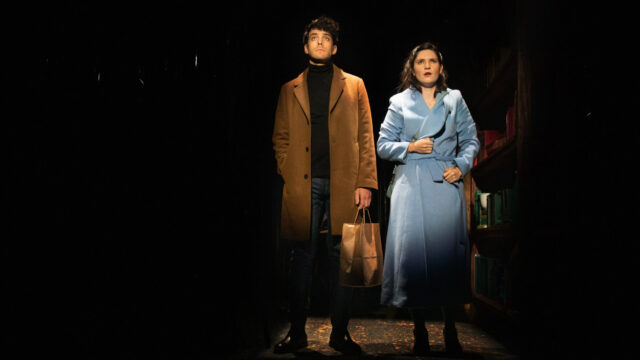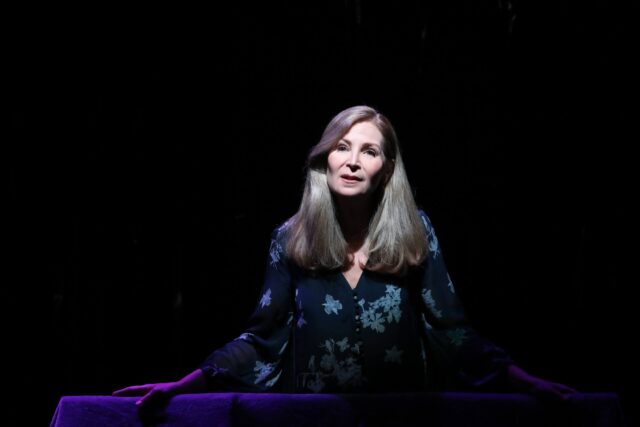
Ball (Ben Edelman) and Ida’s (Liba Vaynberg) relationship kicks off in an elevator in The Gett (photo by Bronwen Sharp)
THE GETT
Rattlestick Playwrights Theater
224 Waverly Pl.
Wednesday – Monday through December 11, $45
www.rattlestick.org
When was the last time you saw a new show that was accompanied by a sixty-three-page dramaturgy packet? You’ll find one for The Gett, an offbeat, extremely clever — almost too much so for its own good — and ultimately satisfying play in which a young woman imagines her relationship with men through the lens of the creation of the world.
The ninety-minute work, written by and starring the charming Liba Vaynberg and continuing at the Rattlestick through December 11, is divided into seven sections that essentially follow the biblical seven-day creation story. Vaynberg, in a modest wedding dress, takes the stage, holding up a sheet of parchment, explaining what a gett is. “The gett is technically just an old religious document of divorce,” she says. “An old text on a piece of paper / That needs a rewrite — / Revision / Re-creation.”
Vaynberg is Ida — pronounced EE-dah, not eye-dah like my own grandmother, who had unique, freethinking views about a woman’s sexuality. Ida tells us, “Six thousand years ago I fell in love with a man. / I mean, sometimes it feels like a week ago. / Depends on when you ask me. And how.” She also sets up one of the play’s key themes when she says, “None of this is real. Or true. / It’s just what I believe.” The Gett is about faith — in G-d and religion, in family, in love, and, perhaps most important, in oneself.
On her way to a Christmas party at her friend Lilah’s apartment on the twenty-third floor, Ida, a poet who works in a library, gets stuck in an elevator with Baal (Ben Edelman), a tall, lanky man who is also going to the fête, bringing Chinese food. Vaynberg has painstakingly made nearly every single detail of the play relevant, every name, every prop, every number, nearly all of which are pointed out in the dramaturgy packet.
Ida means “witness” in Hebrew and has a numerological value of two; a gett would make a couple into a pair of ones. Baal means “husband,” “owner,” “false, violent god,” or “slavemaster” in Hebrew, is the name of the Canaanite god of fertility, and evokes the Baal Shem Tov, the eighteenth-century Ukrainian rabbi, mystic, and healer who founded Hasidic Judaism and whose name means “Master of the Good Name”; just as human beings cannot know or pronounce the full name of G-d, Baal, who is a magician and inventor, says to Ida, “I have a weird name no one can pronounce.” The floor number conjures Psalm 23, which includes the lines “The Lord is my shepherd; I shall not want. . . . He leads me in paths of righteousness for his name’s sake.” Lilah, derived from Delilah, the Philistine beauty who betrayed Samson, has been interpreted to be the angel of conception and the opposite of Lilith, Adam’s first wife (and Baal’s second wife in the play). And Baal and Ida meet on Christmas Day, celebrated as the day Jesus Christ was born.

Ida’s mother (Jennifer Westfeldt) chats away on the phone throughout new play (photo by Bronwen Sharp)
As Ida meets with a divorce attorney and starts dating other men (all unnamed, all played by Luis Vega with different accents), Baal occasionally watches from the corners, an all-seeing figure hovering over her life. During one of her dates, Baal appears in her mind, magically pulling a condom for her out of thin air, then making it disappear. (Alexander Boyce serves as magic consultant.) Baal later shows up for real, asking Ida to give him a gett.
Meanwhile, Ida’s mother (Jennifer Westfeldt) incessantly calls her daughter, leaving long, gossipy messages when Ida doesn’t pick up, going on and on about Ida’s future, how friends’ kids are doing, and how her father has taken up kabbalah, the esoteric discipline involving mysticism. In a script note, Vaynberg explains about Mama, “No Jewish woman is complete without her.” We never see the father, as Judaism is a matriarchal religion, passed through the mother. “It’s never too early to procreate. No one thinks produce is going bad in the fridge,” Mama says. “I can say these things; I’m your mother.” Ida is petrified when her mother tells her to go to a sex store and find out where her G-spot is, then discusses some of the sexual role-playing she and Ida’s father engage in, things no child should know about their parents. But Jewish mothers have no boundaries.
Vaynberg (Scheiss Book, The Oxford Comma) has no boundaries as well, and that’s one of the elements that makes The Gett so successful. She is immediately likable as Ida; it’s impossible not to root for her even when she goes off track. Director Daniella Topol (Novenas for a Lost Hospital, Ironbound) smooths out some of the rough edges, but the narrative is still too choppy. The set, anchored by a screen of what looks like vertical filmstrips that open up to reveal other spaces (an elevator, a living room, a lawyer’s office), is by Misha Kachman, with costumes by Johanna Pan, lighting by Paul Whitaker, and extensive sound effects by Megumi Katayama.
Edelman (The Chosen, Admissions) is a fine foil as Baal, Vega (The Underlying Chris, Change Agent) effectively portrays a series of non-Jews, and Tony nominee Westfeldt (Wonderful Town, Kissing Jessica Stein) has a field day as Ida’s mother, who I can practically still hear chatting away on the phone.
Like Ida’s mother’s phone messages, Vaynberg can get caught up in trivialities, but the majority of the story is delightfully appealing and relatable whether you’re Jewish or not, exploring universal truths about family, faith, and love. You might not believe in religion, and rituals might not be your thing, but you will leave the theater believing in Vaynberg.